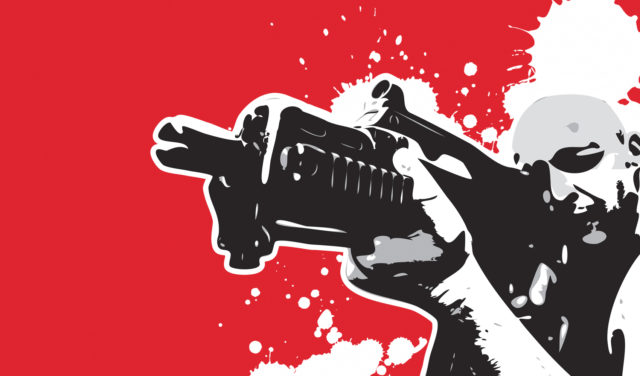
A week after the Feb. 14 shooting at Marjory Stoneman Douglas High in Parkland, Florida, two nonprofit gun-control organizations placed a two-page ad in The New York Times identifying 276 members of Congress who’ve taken money from the National Rifle Association (NRA). Among those names were all four Republicans in Colorado’s House delegation, as well as Sen. Cory Gardner.
At the state level, however, the NRA’s influence is less direct, but equally powerful.
According to filings made with the Secretary of State’s office, the NRA hasn’t made a direct monetary contribution to any member of the Colorado General Assembly since 2010.
But of course, the NRA is still present in Colorado politics. The group’s federal political action committee — bluntly named the Political Victory Fund (PVF) — made contributions from 2012 to 2016 to Colorado’s Senate Majority Fund (“dedicated to retaining a Republican majority in the Colorado Senate,” according to its website). PVF also gave to the NRA Committee to Restore Coloradans’ Rights, which most often received contributions from the NRA’s lobbying arm, the Institute for Legislative Action.
In 2016, PVF contributed nearly $75,000 to its own independent expenditure committee in Colorado, aptly named the NRA Political Victory Fund IE Committee. These “IE” committees can spend in support or opposition of any candidate (or group of candidates), but can’t consult or coordinate with the candidate. In Colorado, IE committees must file with the Secretary of State’s office “detailing candidates, ballot measure numbers, or policy positions” it supports or opposes. Any spending must be reported within two business days after it takes place.
This independent money can be used in a number of ways. For example, a $24,268.30 donation accepted by the NRA-PVF IE committee on Oct. 28, 2016 was slated for use in electioneering communication, i.e., radio, TV, cable or satellite ads. A much smaller donation accepted the next day, just over $1,700, wasn’t specifically earmarked, which means it could have gone to ground operations like door-to-door campaigns, vote-guide mailers or something else.
Perhaps the best example of this kind of indirect funding in Colorado was the NRA’s role in bankrolling the successful 2013 recall (the first successful recall in Colorado’s history) that ousted two Democratic lawmakers from the General Assembly, former Senate president John Morse and Senator Angela Giron. The lawmakers had made the politically unfortunate choice to sponsor and push gun-control legislation, which Gov. Hickenlooper signed into law in early 2013, requiring universal background checks for gun sales, making buyers pay for their own background checks and limiting ammunition magazines to 15 rounds.
Pro-gun citizen action groups formed in response to the newly minted legislation. The now seemingly defunct (if the website is any indicator) Basic Freedom Defense Fund (BFDF) mounted the campaign to recall Sen. Morse, while the Pueblo Freedom and Rights (PFR) led the campaign to recall Sen. Giron.
According to reporting by the Pueblo-based digital magazine The Pulp, PFR founder Victor Head met board members of BFDF, including founder Tim Knight, on firearm-enthusiast website AR-15.com.
While initially not connected beyond their desire to unseat the two senators, the two groups began to work closely together after both organizations faced lawsuits looking to invalidate the signatures they’d obtained to initiate recall elections.
Keith Coniglio, a board member of BFDF, made a post in a forum on AR-15.com on Aug. 8, 2013 stating, “The NRA finally came through in a big way, helping [BFDF] immensely with a ridiculously large (think ‘five-digit’ — and then probably double the number you think) legal bill. The statewide [National Shooting Sports Foundation] also helped out by providing office space for us to use as a HQ and Americans for Prosperity [Koch Brothers] are helping by running the phone bank and handling the walking effort.”
BFDF ultimately contributed more than $2,000 to PFR, according to state contribution filings. While the BFDF website is all but nonoperational now, The Pulp reported in 2013 that the organization’s website stated they provided “overall monetary, legal, organizational, outreach and media support to several issue committees targeting key offenders for such recall. Any donations given to the BFDF go towards the recall committees under the BFDF umbrella.”
The NRA’s involvement in the recall process, while roundabout, was really no secret. In May 2013, CNN obtained an NRA mailer addressed to a “Second Amendment Supporter” that read: “Your NRA is coordinating a recall effort with the Basic Freedom Defense Fund to put Senator Morse on the ballot for a special election and vote him out of office.”
The mailer then instructed the recipient to find and sign the petition “to recall Senator Morse.”
After the successful recall election in 2013, Sens. Morse and Giron were replaced by Republican candidates, turning the once Democratic-held Senate in the Republican’s favor.
We may not always see the NRA’s influence in our state’s politics, but it’s always there














